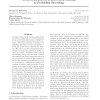Free Online Productivity Tools
i2Speak
i2Symbol
i2OCR
iTex2Img
iWeb2Print
iWeb2Shot
i2Type
iPdf2Split
iPdf2Merge
i2Bopomofo
i2Arabic
i2Style
i2Image
i2PDF
iLatex2Rtf
Sci2ools
106
click to vote
ICML
2002
IEEE
2002
IEEE
Action Refinement in Reinforcement Learning by Probability Smoothing
In many reinforcement learning applications, the set of possible actions can be partitioned by the programmer into subsets of similar actions. This paper presents a technique for exploiting this form of prior information to speed up model-based reinforcement learning. We call it an action refinement method, because it treats each subset of similar aca single "abstract" action early in the learning process and then later "refines" ract action into individual actions as more experience is gathered. Our method estimates the transition probabilities P(s |s, a) for an action a by combining the results of executions of action a with executions of other actions in the same subset of similar actions. This is a form of "smoothing" of the probability estimates that trades increased bias for reduced variance. The paper derives a formula for optimal smoothing which shows that the degree of smoothing should decrease as the amount of data increases. Experiments show th...
Action Refinement Method | ICML 2002 | Machine Learning | Similar Actions | Simpler Action Refinement |
Related Content
| Added | 17 Nov 2009 |
| Updated | 17 Nov 2009 |
| Type | Conference |
| Year | 2002 |
| Where | ICML |
| Authors | Carles Sierra, Dídac Busquets, Ramon López de Mántaras, Thomas G. Dietterich |
Comments (0)

